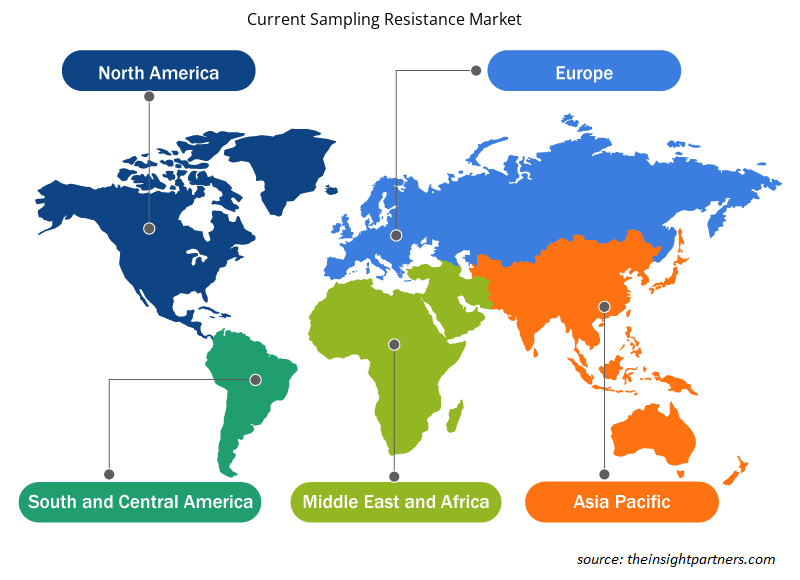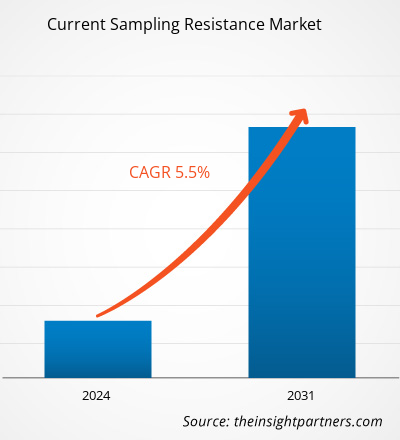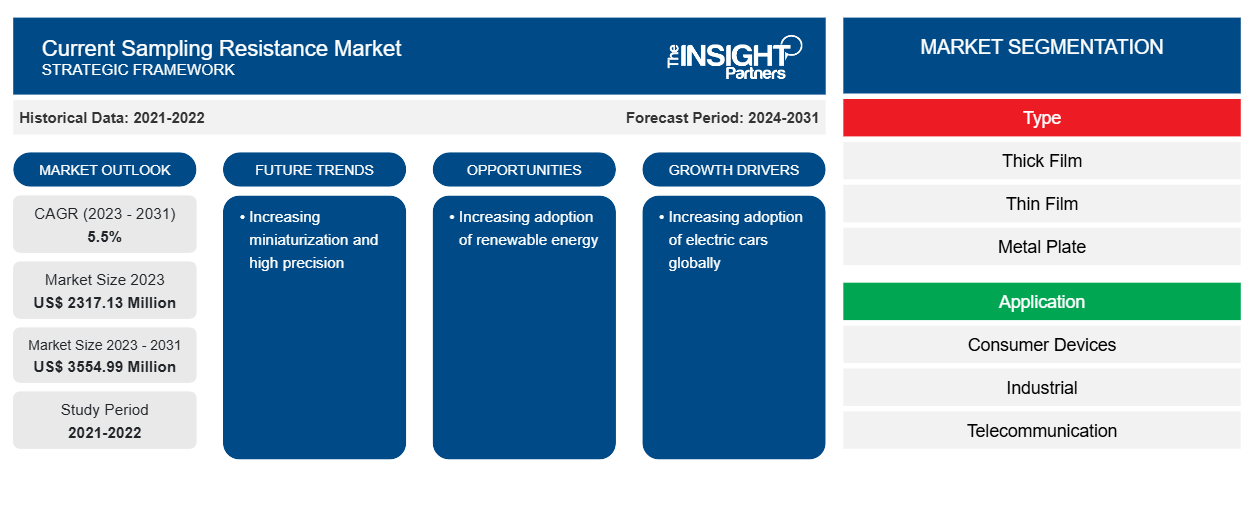Der aktuelle Markt für Probenahmewiderstände soll von 2317,13 Millionen US-Dollar im Jahr 2023 auf 3554,99 Millionen US-Dollar im Jahr 2031 anwachsen. Der Markt wird im Zeitraum 2023–2031 voraussichtlich eine durchschnittliche jährliche Wachstumsrate von 5,5 % verzeichnen. Zunehmende Miniaturisierung und hohe Präzision dürften weiterhin ein wichtiger Trend auf dem Markt bleiben.CAGR of 5.5% during 2023–2031. Increasing miniaturization and high precision are likely to remain a key trend in the market.
Aktuelle Sampling-Resistenz-Marktanalyse
Die Verwendung von hochdichten Montagewiderständen in mehreren Anwendungen dürfte die Geschwindigkeit erhöhen, da die Praxis, mehr Leistung auf kleinerem Raum zu erzielen, immer wichtiger wird. Die Widerstände der Größe 01005 Zoll (0,0160,08 Zoll) werden in Smartphones und tragbaren Geräten eingesetzt. Die runde Montage, die eine Feinrastermontage ermöglicht , und die Via-in-Pad-Montage, bei der Löcher in das Komponentenpad gebohrt werden, um Muster auf der Oberflächenschicht zu vermeiden, haben die Montagedichte in mehreren Anwendungen verbessert. Daher entwickeln Unternehmen hochdichte montierte Widerstände, um den Bedarf zu decken.
Aktueller Überblick über den Markt für Probenahmewiderstände
Der Stromabtastwiderstand eines Materials ist die Behinderung, die durch den Strom- oder Ladungsfluss durch das Material verursacht wird. Je höher der Widerstand, desto geringer ist die Strommenge, die durch das Material fließt. Es ist die Eigenschaft eines Materials, die uns über den Stromfluss durch das Material informiert. Substanzen, die den elektrischen Strom leicht leiten, werden Leiter genannt und haben einen sehr geringen elektrischen Widerstand. Substanzen, die den elektrischen Strom dagegen nicht leicht leiten, werden Isolatoren genannt und haben einen sehr hohen Widerstand.
Passen Sie diesen Bericht Ihren Anforderungen an
Sie erhalten kostenlose Anpassungen an jedem Bericht, einschließlich Teilen dieses Berichts oder einer Analyse auf Länderebene, eines Excel-Datenpakets sowie tolle Angebote und Rabatte für Start-ups und Universitäten.
-
Holen Sie sich die wichtigsten Markttrends aus diesem Bericht.Dieses KOSTENLOSE Beispiel umfasst eine Datenanalyse von Markttrends bis hin zu Schätzungen und Prognosen.
Aktuelle Markttreiber und Chancen für Sampling-Resistenzen
Weltweit zunehmende Verbreitung von Elektroautos
Mit der zunehmenden Verbreitung von Elektroautos wächst der Markt, da verschiedene Akteure Elektroautos auf den Markt bringen. Elektrischer Widerstand ist beispielsweise die Behinderung, die das Material dem Strom- oder Ladungsfluss durch das Material entgegensetzt. Außerdem werden in den USA etwa 2,3 Millionen Elektrofahrzeuge produziert, im Vergleich zu 18 Millionen außerhalb der USA. Dem gleichen Bericht zufolge werden Elektrofahrzeuge im Jahr 2025 etwa 10 % der weltweiten Produktion von leichten Elektrofahrzeugen ausmachen. Daher treibt die zunehmende Verbreitung von Elektroautos weltweit den aktuellen Markt für Probenahmewiderstände an.
Zunehmende Nutzung erneuerbarer Energien
Steigende Investitionen in Smart Grids und erneuerbare Energien dürften dem Schaltanlagenmarkt zahlreiche Chancen bieten. Beim Smart Grid-Betrieb wird der automatisierte Schaltanlagenbetrieb dem konventionellen Betrieb vorgezogen. Ein automatisiertes Umspannwerk, in dem alle Vorgänge automatisiert sind, ist effizienter und erfordert weniger Personal. Darüber hinaus investieren Regierungen verschiedener Volkswirtschaften in die Smart Grid-Technologie. So kündigte Japan im Jahr 2022 ein Finanzierungsprogramm in Höhe von 155 Milliarden US-Dollar an, um Investitionen in Smart Grids anzukurbeln. Im selben Jahr richtete die indische Regierung ein 38-Milliarden-US-Dollar-Programm ein, um Stromverteilungsunternehmen zu unterstützen und die Verteilungsinfrastruktur zu verbessern. Somit schafft die zunehmende Nutzung erneuerbarer Energien weitere Chancen für den Markt.switchgear market. In smart grid operation, automated switchgear operation is preferred over conventional operation. An automated substation, wherein all operations are automated, is more efficient and requires less manpower. Further, governments of various economies are investing in the smart grid technology. For instance, in 2022, Japan announced a financing program of US$155 billion to spur investment in smart grids. That same year, in India, the government established a US$38-billion scheme to help power distribution companies and improve distribution infrastructure. Thus, the increasing adoption of
Aktueller Marktbericht zur Probenentnahmebeständigkeit – Segmentierungsanalyse
Wichtige Segmente, die zur Ableitung der aktuellen Marktanalyse zum Probenahmewiderstand beigetragen haben, sind Typ und Anwendung.
- Basierend auf dem Typ ist der aktuelle Markt für Probenahmewiderstände in Dickschicht, Dünnschicht und Metallplatte unterteilt. Das kundenspezifische Segment hatte im Jahr 2023 einen größeren Marktanteil.
- Nach Installation ist der Markt in Aufputz-, Hänge- und Einbau-/Seitenwandmontage unterteilt. Das Aufputzsegment hatte im Jahr 2023 einen größeren Marktanteil.
- Nach Typ ist der Markt in LED-Beleuchtung, Glühlampenbeleuchtung, Leuchtstofflampen und andere unterteilt.
- Nach Anwendung ist der Markt in Verbrauchergeräte, Industrie-, Telekommunikations-, Automobil- und andere Anwendungen segmentiert.
Aktuelle Marktanteilsanalyse für Sampling-Widerstände nach Geografie
Der geografische Umfang des aktuellen Marktberichts zum Probenahmewiderstand ist hauptsächlich in fünf Regionen unterteilt: Nordamerika, Asien-Pazifik, Europa, Naher Osten und Afrika sowie Süd- und Mittelamerika.
APAC dominiert den aktuellen Markt für Abtastwiderstände. Der aktuelle Markt für Abtastwiderstände in dieser Region wächst aufgrund verschiedener Faktoren, wie z. B. zunehmender staatlicher Initiativen zur Verbesserung des Zustands von Elektroautos und der Präsenz etablierter Akteure. Metallplattenchip-Widerstände mit niedrigem Widerstand, extrem geringer parasitärer Induktivität und hochgenauer Strommessung sind von verschiedenen Herstellern erhältlich. Darüber hinaus nähert sich die Widerstandsreduzierung ihrer Grenze, und die Modularisierung wird sich in Zukunft wahrscheinlich auf alle Arten von Geräten ausweiten. dominates the current sampling resistance market. The current sampling resistance market in this region is growing due to various factors, such as increasing government initiatives to improve the condition of electric cars and the presence of well-established players. Metal plate chip low resistance resistors with extremely low parasitic inductance and high accuracy current sensing are available from various manufacturers. Furthermore, resistor reduction is nearing its limit, and modularization is likely to expand across all kinds of equipment in the future.
Aktuelle regionale Einblicke in den Markt für Probenahmewiderstände
Die regionalen Trends und Faktoren, die den aktuellen Markt für Sampling Resistance während des gesamten Prognosezeitraums beeinflussen, wurden von den Analysten von Insight Partners ausführlich erläutert. In diesem Abschnitt werden auch die aktuellen Marktsegmente und die Geografie für Sampling Resistance in Nordamerika, Europa, im asiatisch-pazifischen Raum, im Nahen Osten und Afrika sowie in Süd- und Mittelamerika erörtert.

- Holen Sie sich die regionalen Daten für den aktuellen Markt für Probenahmewiderstände
Umfang des aktuellen Marktberichts zum Sampling-Widerstand
| Berichtsattribut | Details |
|---|---|
| Marktgröße im Jahr 2023 | 2317,13 Millionen US-Dollar |
| Marktgröße bis 2031 | 3554,99 Millionen US-Dollar |
| Globale CAGR (2023 - 2031) | 5,5 % |
| Historische Daten | 2021-2022 |
| Prognosezeitraum | 2024–2031 |
| Abgedeckte Segmente |
Nach Typ
|
| Abgedeckte Regionen und Länder |
Nordamerika
|
| Marktführer und wichtige Unternehmensprofile |
|
Aktuelle Dichte der Marktteilnehmer im Bereich Sampling Resistance: Verständnis ihrer Auswirkungen auf die Geschäftsdynamik
Der Markt für aktuelle Sampling-Resistenzen wächst rasant, angetrieben durch die steigende Nachfrage der Endnutzer aufgrund von Faktoren wie sich entwickelnden Verbraucherpräferenzen, technologischen Fortschritten und einem größeren Bewusstsein für die Vorteile des Produkts. Mit steigender Nachfrage erweitern Unternehmen ihr Angebot, entwickeln Innovationen, um die Bedürfnisse der Verbraucher zu erfüllen, und nutzen neue Trends, was das Marktwachstum weiter ankurbelt.
Die Marktteilnehmerdichte bezieht sich auf die Verteilung der Firmen oder Unternehmen, die in einem bestimmten Markt oder einer bestimmten Branche tätig sind. Sie gibt an, wie viele Wettbewerber (Marktteilnehmer) in einem bestimmten Marktraum im Verhältnis zu seiner Größe oder seinem gesamten Marktwert präsent sind.
Die wichtigsten Unternehmen, die derzeit auf dem Markt für Probenahmewiderstände tätig sind, sind:
- Cyntec Co., Ltd
- KOA Speer Electronics, Inc
- Panasonic Corporation
- ROHM CO., LTD
- Samsung Electro-Mechanics Co., Ltd.
- Susumu Co., Ltd
Haftungsausschluss : Die oben aufgeführten Unternehmen sind nicht in einer bestimmten Reihenfolge aufgeführt.

- Erhalten Sie einen Überblick über die wichtigsten Akteure des aktuellen Marktes für Sampling-Resistenz
Aktuelle Nachrichten und aktuelle Entwicklungen zum Sampling-Resistenzmarkt
Der aktuelle Markt für Probenresistenz wird durch die Erhebung qualitativer und quantitativer Daten nach Primär- und Sekundärforschung bewertet, die wichtige Unternehmensveröffentlichungen, Verbandsdaten und Datenbanken umfasst. Nachfolgend sind einige der Entwicklungen auf dem aktuellen Markt für Probenresistenz aufgeführt:
- TT Electronics, ein weltweiter Hersteller elektronischer Komponenten für leistungskritische Anwendungen, hat seine Metallfolien-Chip-Widerstände (MFC) vorgestellt. Die MFC-Serie nutzt Metallfolie auf Keramiktechnologie, die die Wärmeverteilungseigenschaften eines Keramiksubstrats mit der Überspannungstoleranz eines Widerstandselements aus massiver Metalllegierung kombiniert. (Quelle: TT Electronics, Pressemitteilung, November 2020)
- ROHM hat die Verfügbarkeit von Shunt-Widerständen der GMR50-Serie angekündigt, die branchenführende 4 W Nennleistung (bei Elektrodentemperatur TK = 90 °C) im kompakten 5,0 mm x 2,5 mm (Gehäusetyp 2010) bieten. Sie eignen sich für die Stromerkennung in Motoren und Stromversorgungskreisen, die in Automobilsystemen und Industrieanlagen eingesetzt werden. (Quelle: ROHM, Pressemitteilung, Februar 2020)
Aktueller Bericht zum Markt für Probenahmeresistenzen: Abdeckung und Ergebnisse
Der Bericht „Aktuelle Marktgröße und Prognose für Sampling-Resistenz (2021–2031)“ bietet eine detaillierte Analyse des Marktes, die die folgenden Bereiche abdeckt:
- Aktuelle Größe und Prognose des Marktes für Probenahmebeständigkeit auf globaler, regionaler und Länderebene für alle wichtigen Marktsegmente, die im Rahmen des Berichts abgedeckt sind
- Aktuelle Markttrends im Bereich Sampling-Resistenz sowie Marktdynamiken wie Treiber, Einschränkungen und wichtige Chancen
- Detaillierte PEST/Porters Five Forces- und SWOT-Analyse
- aktuelle Marktanalyse zur Probenentnahmeresistenz, die wichtige Markttrends, globale und regionale Rahmenbedingungen, wichtige Akteure, Vorschriften und aktuelle Marktentwicklungen umfasst
- Branchenlandschaft und Wettbewerbsanalyse, die die Marktkonzentration, Heatmap-Analyse, prominente Akteure und aktuelle Entwicklungen für den aktuellen Markt für Probenahmeresistenz umfasst
- Detaillierte Firmenprofile
- Historische Analyse (2 Jahre), Basisjahr, Prognose (7 Jahre) mit CAGR
- PEST- und SWOT-Analyse
- Marktgröße Wert/Volumen – Global, Regional, Land
- Branchen- und Wettbewerbslandschaft
- Excel-Datensatz
Aktuelle Berichte
Erfahrungsberichte
Grund zum Kauf
- Fundierte Entscheidungsfindung
- Marktdynamik verstehen
- Wettbewerbsanalyse
- Kundeneinblicke
- Marktprognosen
- Risikominimierung
- Strategische Planung
- Investitionsbegründung
- Identifizierung neuer Märkte
- Verbesserung von Marketingstrategien
- Steigerung der Betriebseffizienz
- Anpassung an regulatorische Trends























 Kostenlose Probe anfordern für - Aktueller Markt für Stichprobenwiderstand
Kostenlose Probe anfordern für - Aktueller Markt für Stichprobenwiderstand